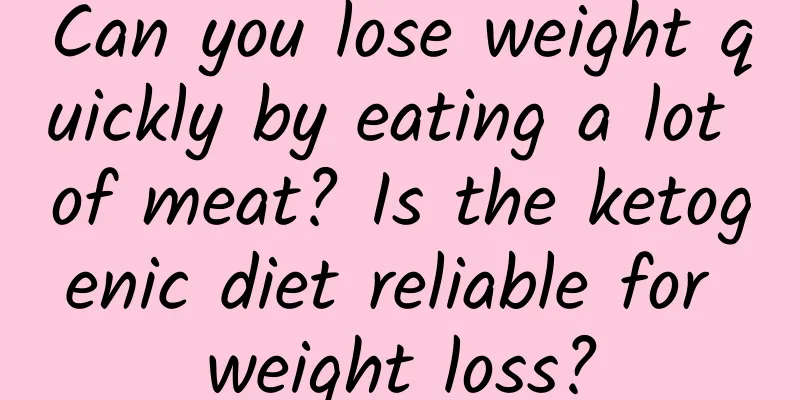Can you lose weight quickly by eating a lot of meat? Is the ketogenic diet reliable for weight loss?

|
Hi, the weight gained from eating all summer has not been lost yet, and it is the season of putting on weight in autumn. Many people, especially young men and women who love beauty, have turned their attention to the popular weight loss method on major social platforms - "ketogenic diet". Eating a lot of meat and losing XX pounds a month is really exciting! BUT! Can you really have your cake and eat it too? Is the "ketogenic diet" really reliable for weight loss? ————Too long not to read version———— Q1: What exactly is the ketogenic diet? The ketogenic diet is a diet that is mainly fat, with moderate protein and very little carbohydrates. The amount of carbohydrates is usually no more than 50g (you should know that a medium-sized banana, assuming the edible part is 100g, has about 22g of carbohydrates). This extreme diet will force our body to change the way it supplies energy: from breaking down carbohydrates to produce glucose, to relying on the breakdown of fat to produce ketone bodies. This process is called ketosis. Q2: Can the ketogenic diet really help lose weight? If you only care about weight (regardless of health and other factors), then the weight loss effect in the short term will indeed be more obvious. In some scientific studies, some people can lose 2kg or more in a week, and they will lose a lot of fat. However, it cannot be ignored that fat loss may also be accompanied by muscle loss. Moreover, most of these dietary research cases are short-term, such as a few weeks or a month. As for whether it is effective in the long term and whether there will be rebound, there is still controversy. Q3: What are the possible health risks of a ketogenic diet? The obvious ones are malnutrition, decreased immunity, constipation, etc. Because a single food composition can easily lack nutrients such as dietary fiber, minerals, vitamins, etc. These are things you can feel intuitively. But potential risks that may have more serious and long-term impacts may be difficult for you to detect. First, too little carbohydrate intake will increase the risk of all-cause mortality. Second, during the ketosis period, a large amount of ketone bodies may lead to hyperketonemia, ketonuria and metabolic acidosis, which in turn causes bone decalcification, hypercalciuria, and then osteoporosis, while increasing the risk of urolithiasis and kidney stones. Long-term metabolic acidosis can also induce heart diseases such as arrhythmia and cardiomyopathy. Therefore, it is not recommended for ordinary people to blindly follow ketosis to lose weight. Okay, let’s start the main text. 1. What is the ketogenic diet? As we all know, the energy needed by the human body comes from the three major energy-producing nutrients in food: carbohydrates, proteins and fats. Carbohydrates are the main source of energy. In a balanced diet, the energy provided by carbohydrates should account for 50-65% of the total energy [1]. When there is too little carbohydrate in the diet, less than 50g per day, or the energy supply ratio is only 5-10%, and at the same time the energy supply ratio of fat exceeds 60%, the body's first reaction is: blood sugar is in crisis, and then the emergency plan is urgently activated: metabolize fat. As a result of fat metabolism, the concentration of ketone bodies (including acetoacetic acid, β-hydroxybutyric acid, and acetone) in the blood increases, serving as another energy source to replace glucose for energy supply to the body. The ketogenic diet (KD) is therefore named as it is a type of very low carbohydrate diet [3-5]. In our daily lives, most people who follow the ketogenic diet for the purpose of weight loss simply try to eat more fat and no or very little carbohydrates within their own cognitive scope and willpower, without paying much attention to the proportions. In the strict sense, the ketogenic diet has very strict dietary control on the intake ratio of fat, protein and carbohydrates. For example, the intake of carbohydrates must be limited to 50g, and it must be completed under the supervision of doctors, nutritionists and other professionals. This means you should basically say goodbye to these foods: 1. All staple foods including grains and potatoes: steamed buns, dumplings, rice, rice noodles, fried dough sticks, fried cakes, pot stickers, bread, biscuits, sweet potatoes, corn... 2. Almost all fruits, except avocados; 3. High-carb vegetables: potatoes, taro, yam, pumpkin, lotus root, etc. 2. How effective is the ketogenic diet for weight loss? The ketogenic diet was first used for childhood epilepsy and began to be used to treat obesity in the 1960s with significant results. In recent years, as the number of overweight and obese people continues to increase worldwide, the popularity of the ketogenic diet has continued to increase. Compared with "dieting", the ketogenic diet does not require deliberate restriction of calorie intake, and there is less torment of "starvation", so it is relatively easier to implement and stick to. This is one of the important reasons why it is favored by meat lovers. Since fat itself is digested slowly and stays in the stomach for a long time, coupled with the high satiety and high thermal effect of protein, you will eat less and consume more energy. A large amount of ketone bodies themselves also have the effect of suppressing appetite. In addition, a low-carb diet promotes the decomposition or increased utilization of fat [3, 6], which will lead to weight loss. A large number of studies have shown that if we only look at weight loss, the ketogenic diet is very effective: During the ketogenic diet, weight loss can continue to be rapid. For example, in one study, the average weekly weight loss of test subjects reached or exceeded 2 kg. The ketogenic diet is much more effective in reducing body fat and waist-to-hip ratio than the traditional balanced diet energy control method. As the body gradually adapts to the energy supply of ketone bodies, the weight loss may come largely from the loss of fat, while there will also be muscle loss [7-8]. In a one-month study, the average weight loss on the ketogenic diet was 5kg Image source: Reference [5] 3. Since it can really help lose weight, can everyone achieve “ketosis”? It can not only help you lose weight, but also burn fat quickly. I believe some people are already eager to try it. However, it should be noted that the ketogenic diet is essentially a therapeutic diet for special groups of people. It requires professional evaluation by clinicians and nutritionists to develop a personalized plan, regularly monitor various body indicators and nutritional status, and make timely adjustments and symptomatic treatments to ensure the effectiveness and safety of the treatment. Most of the research cases on the ketogenic diet are based on short-term implementation (such as 1 month), and the safety of its long-term application is still controversial. However, many people do not have enough nutritional knowledge and blindly follow the trend to implement ketogenic diet as "not eating carbohydrates", which is likely to be counterproductive. First, the large amount of ketone bodies produced during the ketogenic diet is a thorny issue. It may lead to hyperketonemia, ketonuria, and metabolic acidosis. Long-term metabolic acidosis may cause bone decalcification, hypercalciuria, osteoporosis, and increase the risk of urolithiasis and kidney stones. Long-term metabolic acidosis may also induce arrhythmia, cardiomyopathy and other heart diseases. Ketone bodies distributed around blood vessels in the skin will cause the aggregation of multiple inflammatory cells. If people on a ketogenic diet develop dense small red bumps in areas prone to sweating, it is a pigmented prurigo (keto rash) induced by a large amount of ketone bodies [6-7,9]. Secondly, in order to reduce muscle loss, the ketogenic diet often increases the intake of dietary protein, while a long-term high-protein diet will increase the burden on the kidneys, aggravate acidosis, and further increase urinary calcium loss. Finally, the ketogenic diet is an extremely low-carb diet. Long-term insufficient intake of grains, vegetables, and fruits will not only cause a deficiency of dietary fiber and micronutrients, but also increase the risk of death: Studies have shown that there is a U-shaped relationship between the carbohydrate energy ratio in the diet and all-cause mortality. When it is less than 40% and more than 70%, there is a higher risk of death than moderate carbohydrate intake [10]. The latest "2020-2025 US Dietary Guidelines Scientific Report" also shows that a low-carb diet can increase the risk of premature death by up to 32%, and the risk of death from coronary heart disease, cerebrovascular disease, and cancer is increased [11]. The U-shaped curve of the relationship between carbohydrate intake and all-cause mortality. When the carbohydrate supply percentage is 50-55%, the risk of death is the lowest. Image source: Reference [12] The closer your diet is to a strict ketogenic diet, the higher the possibility of the above risks, and even far greater than the benefits you gain in losing fat and weight. For normal people, if they do not have enough nutritional knowledge, they may not be able to identify the invisible carbohydrates in some foods and cannot enter the "ketosis" state. At this time, if they still blindly "eat meat", they will only get fatter and fatter. Therefore, it is not recommended for ordinary people to blindly rely on the ketogenic diet to lose weight. Conclusion Some people may ask, since there are risks in the ketogenic diet, how about I choose a high-protein or low-fat diet? In fact, eliminating or significantly increasing the intake of any single nutrient is not a long-term solution. For most people, a sustainable weight loss plan should be to control the total energy intake under the premise of balanced dietary nutrition, and then add appropriate exercise and a reasonable work and rest schedule to form a certain calorie gap. In terms of food selection, eat more low-GI, high-satiety, high-nutrient-density foods, and eat less highly processed snacks. There is no need to be afraid of "fat" or avoid "carbs". Finally, let me say something off topic. Today’s girls are more or less troubled by body anxiety. In fact, some of them are not fat, and are even far from the standard of overweight. However, in order to cater to the current mainstream aesthetics, they are too demanding on themselves and blindly lose weight. They suffer from dieting and rebounding, and even damage their health. Therefore, instead of changing your body shape, it is better to change your aesthetics first, and at the same time accumulate some professional and correct nutrition knowledge. Health + confidence is our most beautiful appearance! References: [1] 2016 Dietary Guidelines for Chinese Residents. [2] Expert consensus on medical nutrition therapy for overweight/obesity in China (2016 edition). [3] Wang Chen, Ren Xue, Hou Bin, et al. A case study on the effects of long-term ketogenic diet on body composition and health of sports enthusiasts[J]. Sports Science Research, 2019, 40(06): 87-92. [4] Zhang Yingli, Zhou Yanhua, Li Zhuo, et al. Effects of ketogenic diet on neural damage, anxiety and depression in patients with Alzheimer's disease[J]. Chinese Journal of Practical Neurological Diseases, 2021, 24(01): 49-53. [5] Yang Hui, Zhang Pianhong, Jiang Bo, et al. Effects of ketogenic diet and energy-restricted balanced diet on body composition and biochemical indices in overweight and obese subjects[J]. Journal of Nutrition, 2018, 40(04): 403-405. [6] Wang Qian, Tian Ying. Weight loss mechanism and potential harm of ketogenic diet[J]. Food Research, 2021, 38(01):71-75. [7] Zhou Yanru. A brief analysis of the application of ketogenic diet in weight management[J]. Contemporary Sports Science and Technology, 2021, 11(16): 35-37. [8] Yang Hui, Zhu Jiangli, Chen Qiuxia, et al. Study on the effect of ketogenic diet on obesity[J]. Electronic Journal of Tumor Metabolism and Nutrition, 2017, 4(03): 333-337. [9] Cai Jingjing. Ketogenic diet for weight loss has hidden risks[N]. People's Health News, 2021-08-17(006). [10] Sara B Seidelmann, Brian Claggett, Susan Cheng, et al. Dietary carbohydrate intake and mortality: a prospective cohort study and meta-analysis[J]. The Lancet Public Health, 2018, 3(9): e419-e428, [11] 2020-2025 Dietary Guidelines for Americans Scientific Report. [12] Scientific Report on Chinese Dietary Guidelines 2021. |
>>: The difference in the degree of my two eyes is getting bigger and bigger. What’s going on?
Recommend
What should I do if I have kidney disease and always feel weak and exhausted?
1. Adjust your work and rest schedule Ensure adeq...
I'm in menopause and I don't want to live anymore
Menopause is a difficult time for women. Many wom...
Does anterior uterine fibroids affect pregnancy?
We all know that diseases such as tumors and canc...
On which day after menstruation should prolactin be checked?
Prolactin, also known as prolactin, is a hormone ...
Stanford’s latest research: Be careful of “cliff-like aging” at 44 and 60 years old!
The original meaning of "衰" refers to a...
ICU ward: revealing the story behind critical care
The ICU ward is an intensive care unit in a hospi...
What causes frequent fetal movements?
Fetal movement is very important for pregnant wom...
Jack Morton: Social network users in Brazil, China and India are more receptive to social word of mouth
As growth in their domestic markets stagnates, glo...
What causes a fishy vaginal odor?
For friends who have a fishy smell in the vagina,...
How do you know the size of your pelvis?
The size of the pelvis is very important for wome...
What is sudden menopause?
Menstruation is a physiological phenomenon for fe...
What are the cervical polyp inflammations
Cervical polyp inflammation is a very complex dis...
Are things that rats have crawled over poisonous? How can you tell if there are rats in the air conditioner?
Mouse (commonly known as "rat"), a rode...









